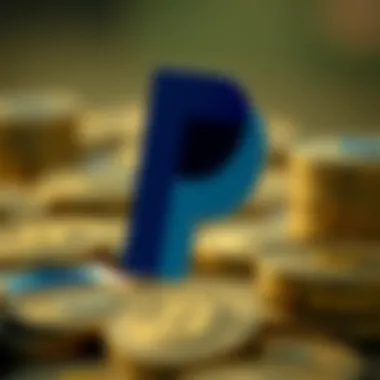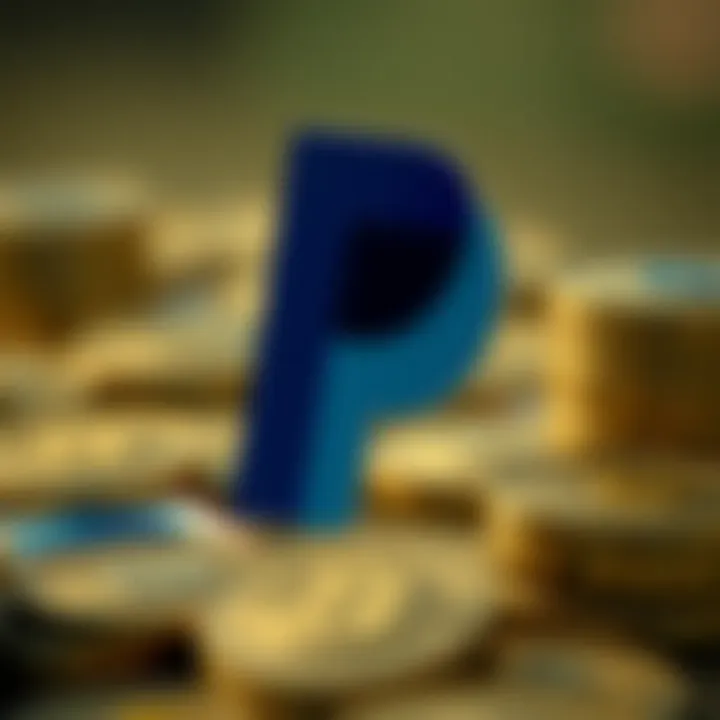PayPal Partnerships and Their Impact on Cryptocurrency


Intro
In the realm of digital finance, PayPal stands as a giant, not only shaping consumer payment methods but also influencing the trajectory of cryptocurrencies. Over the past few years, PayPal's strategic partnerships have stirred quite a buzz among investors, analysts, and crypto enthusiasts alike. These collaborations have implications that extend beyond mere financial transactions; they penetrate the fabric of the cryptocurrency ecosystem itself.
Understanding the intricate web of partnerships that PayPal weaves can provide profound insights into the motivations driving the financial technology space. This article aims to dissect these partnerships, exploring their lengths, depths, and ramifications. Each collaboration sheds light on PayPal's role as it leverages its vast network to catalyze market trends, consumer adoption, and regulatory dialogue.
The landscape is ever-evolving, and with every new partnership, there lies an opportunity to reassess the dynamics within the cryptocurrency market. As we navigate through this exploration, it's crucial to grasp not just what these partnerships mean, but why they are pivotal in shaping an increasingly digital finance framework. From exchanges to blockchain providers, these alliances are pivotal in sculpting how consumers engage with cryptocurrencies, but there's more to the story. In a sector marked by regulatory scrutiny and rapid technological advancement, PayPal's decisions can act as bellwethers for the future directions of this thriving digital frontier.
With this context in mind, let’s delve deeply into the crypto concepts that underpin these partnerships and examine their broader implications in the financial world.
Understanding PayPal's Position in Financial Technology
In today's fast-paced digital world, the place of PayPal in financial technology cannot be overstated. It's not just a payment processor anymore; it's a crucial player that shapes how consumers and businesses interact with money online. This section aims to dissect PayPal's journey and significance within this evolving landscape by evaluating its past, present, and future prospects.
A Historical Overview of PayPal
PayPal’s roots trace back to 1998 when it first launched as Confinity. Initially a software company focused on creating security software for handheld devices, it quickly pivoted to developing a digital wallet. In 2000, PayPal merged with X.com, an online banking company co-founded by Elon Musk. By 2002, after a whirlwind period of growth and changes, eBay acquired PayPal for $1.5 billion. As a result, PayPal became the sole payment service for eBay transactions, setting the groundwork for its explosion in popularity.
In the subsequent years, PayPal diversified its services, introducing features like PayPal Credit and the ability for businesses to integrate its payment options into their websites. Its presence over the years has grown substantially, thanks to a strategy capitalizing on user trust and security. Today, PayPal serves hundreds of millions of users and is recognized as a leader in transforming e-commerce.
"PayPal has shown us that with strategic expansion and innovation, a company can not only survive but thrive in the ever-changing financial landscape."
The Rise of Digital Payments
The digital payment revolution emerged alongside the internet's expansion in the late 1990s and early 2000s. As more consumers began flocking to online shopping, the need for a reliable, secure transaction method grew. PayPal recognized this trend and adapted quickly, becoming synonymous with online payments.
Today, PayPal is more than just an online checkout option; it’s deeply embedded into various financial facets, such as:
- Mobile Payments: With the rise of smartphones, PayPal has integrated mobile payment functionalities that have simplified how money is transferred.
- Cryptocurrency Transactions: As digital currencies gain traction, PayPal has taken steps to allow users to buy, hold, and sell various cryptocurrencies directly through its platform.
- Global Reach: Operating in over 200 markets, PayPal provides a widely accepted payment solution that caters to diverse currencies and payment methods.
This transformation signifies a broader movement towards embracing digital payment methods, which is crucial for businesses wanting to tap into the millennial market and beyond. PayPal’s strategic positioning at the forefront of this change showcases its ability to not only keep up with evolving trends but also lead them. By grasping the changing consumer behavior and acting accordingly, PayPal solidifies its role as a major influencer in financial technology.
Through its historical milestones and innovative pivot to digital payment paradigms, understanding PayPal's progress is essential to grasping the wider implications it has within the cryptocurrency ecosystem and beyond.
The Importance of Partnerships for PayPal
In the rapidly evolving landscape of financial technology, the role of strategic partnerships cannot be overstated. For PayPal, which has been at the forefront of digital transactions, these alliances are crucial for maintaining its competitive edge and expanding its influence in the cryptocurrency arena. By forming partnerships across various sectors, PayPal not only broadens its service offerings but also solidifies its standing as a trusted player in an increasingly complex market.
Partnerships allow PayPal to harness external expertise and resources, enabling it to innovate without reinventing the wheel. Collaborations with crypto exchanges, digital wallets, and blockchain technology providers present opportunities to streamline operations, enhance customer experience, and tap into new revenue streams. In essence, every partnership is a stepping stone towards greater integration of digital currency into mainstream financial services.
Additionally, as regulatory scrutiny intensifies, aligning with established businesses can provide a shield against potential compliance risks. Partnering with entities that have a clear understanding of local regulations serves not only to foster consumer trust but also ensures that PayPal remains agile in its operations across different jurisdictions.
The importance of these partnerships is exemplified by several key factors:
- Access to New Technologies: By working with innovators in blockchain and payment processing, PayPal can better align its services with market expectations.
- Market Expansion: Partnerships place PayPal in a position to penetrate markets it might not be able to enter independently, especially in regions with growing crypto adoption.
- Customer Trust and Loyalty: Collaborating with reputable brands or platforms can reassure consumers about the safety and reliability of crypto transactions facilitated through PayPal.
"Partnerships are not just agreements; they're about building a robust ecosystem that can adapt and thrive as the financial landscape changes."
Strategic Business Alliances
Strategic business alliances form the backbone of PayPal's progress in the cryptocurrency realm. These collaborations often focus on shared targets and resources, creating a win-win situation for all parties involved. By uniting with other players, PayPal can leverage strengths such as market reach, technological advancements, and specialized knowledge.
Take, for instance, PayPal's collaboration with big-name cryptocurrency exchanges like Binance and Coinbase. These partnerships not only enable seamless transactions but also take advantage of the established user bases these platforms boast. Such alliances enhance PayPal's exposure to a broader audience, making digital currencies more accessible to the everyday consumer.
Additionally, companies that specialize in different aspects of cryptocurrency infrastructure—whether security, wallet creation, or regulatory compliance—offer PayPal invaluable insights and capabilities. This form of partnership provides PayPal with the agility to introduce new features and services that respond directly to consumer demand.


Enhancing Service Offerings
The enhancement of service offerings is another significant outcome of PayPal's partnerships. When two or more entities collaborate, they can combine their strengths to create expanded, more comprehensive services for their customer base. In PayPal's case, its offering in the cryptocurrency domain has dramatically improved due to these strategic alliances.
For example, integrating with established crypto wallets enables PayPal users to execute transactions more smoothly without encountering the friction often associated with converting traditional currency to cryptocurrencies. Furthermore, such integration enhances user experience by enabling faster transactions, which is vital in markets where time and agility are of the essence.
Moreover, partnerships often pave the way for innovative features. Functions like instant transfer of crypto to cash or the ability to spend cryptocurrencies at millions of merchants increase usability, making digital currencies more appealing. This is particularly important in a space where user experience can directly translate to adoption rates.
In summary, PayPal’s partnerships play a vital role not just in increasing its footprint in the cryptocurrency ecosystem but also in enhancing the overall experience of users. As these collaborations deepen, the potential for innovation will only grow, reinforcing PayPal's commitment to a future where digital currency is commonplace.
Key Partnerships in the Cryptocurrency Domain
When we talk about key partnerships in the cryptocurrency domain, it’s clear that they hold a unique significance for the entire ecosystem. Not only do these partnerships shape the way cryptocurrencies interact with traditional finance, but they also influence consumer confidence and ease of use in digital transactions.
One of the core benefits of these partnerships is their potential to broaden the accessibility of cryptocurrencies. By collaborating with exchanges and wallets, PayPal enhances its service offerings, making it easier for users to buy, sell, and manage digital assets. This effort not only caters to tech-savvy investors but also aims to bring traditional users into the fold of cryptocurrency usage, which is vital for adoption.
Moreover, partnerships also play a crucial role in the ongoing negotiation with regulators. By aligning with recognized exchanges and wallet services, PayPal can better navigate the murky waters of compliance and risk management, thereby ensuring smoother operations. This opens the door for even more advanced features and integrations that can benefit users in the long run.
Collaborations with Cryptocurrency Exchanges
Binance Collaboration
Delving into PayPal's collaboration with Binance, we see a significant aspect of how this partnership contributes to the overall landscape of cryptocurrency usage. Binance, being one of the world's largest exchanges, provides PayPal users access to a wide range of cryptocurrencies. The key characteristic of this collaboration is its focus on liquidity and user trust.
Why is this partnership beneficial? It's quite straightforward. By partnering with a platform like Binance, PayPal leverages the exchange’s robust infrastructure and reputation, which helps instill confidence in users who are cautious about entering the cryptocurrency market. An unique feature of the Binance collaboration is its focus on seamless transactions, allowing PayPal users to buy cryptocurrencies directly from their accounts without needing to investigate complex external platforms.
However, some disadvantages might arise. The dependency on Binance's regulatory compliance and security can be a double-edged sword. If challenges arise on Binance's end, it might impact PayPal's reputation as well.
Coinbase Integration
Switching gears to Coinbase integration, this partnership also holds noteworthy implications for PayPal's initiatives within cryptocurrency. Coinbase is well-known for its user-friendly interface and strong regulatory compliance, making it a solid choice for PayPal's integration strategy. This partnership particularly appeals to new users, who may feel overwhelmed by the crypto landscape.
A key characteristic here is Coinbase's educational resources, aimed at making cryptocurrency more comprehensible for the average user. This integration allows PayPal to offer informative features that guide users on how to navigate their investments more effectively. The unique feature of Coinbase integration lies in its focus on security as well, offering insurance on digital assets in users' wallets.
Nonetheless, similar to the Binance partnership, there are some drawbacks to consider. Coinbase’s fees can sometimes be on the higher side, which could discourage users from more frequent transactions, impacting PayPal's overall transactional volume.
Wallet Partnerships
Integration with Crypto Wallets
Now let’s shift towards integration with crypto wallets. PayPal’s partnerships with various crypto wallets aim to increase usability and flexibility for users. These partnerships provide direct links between PayPal accounts and digital wallets, streamlining the process of managing crypto assets and traditional currency.
The main reason these integrations are considered beneficial is their effort to eliminate friction in transactions. Users can move their assets with relative ease, which is vital for maintaining a competitive edge in the rapidly evolving crypto market. The unique feature is the simplified user interface, which allows people who are not experts in tech to engage in cryptocurrency transactions confidently.
That said, the downside is that reliance on specific wallet services may limit user choice. Users may become accustomed to certain features and feel hesitant to explore other robust crypto wallets, thus stifling their experience.
User Experience Enhancements
Lastly, we have user experience enhancements from these partnerships, an area where PayPal is investing considerable time and resources. Improved interfaces, quicker transaction speeds, and continual updates serve to elevate the user’s journey. A primary characteristic of this focus is the continuous feedback loop that PayPal engages in with users, ensuring that their needs and concerns are not just heard but acted upon.
This makes enhancements appealing and beneficial, as it actively contributes to higher user retention and brand loyalty. Unique features such as customizable notification settings and in-depth analysis tools can greatly enrich user engagement, ultimately pushing broader cryptocurrency adoption. However, yet again, there is a risk of overengineering features which might confuse users, especially those new to the technology. Too many choices might lead to decision fatigue.
Overall, partnerships in the cryptocurrency domain, especially those that involve exchanges and wallets, are fundamental to creating a more robust ecosystem. As PayPal continues to evolve its network, the implications for users and the broader financial landscape will be profound.
Impact on Consumer Behavior and Adoption


Understanding the effects of PayPal's partnerships on consumer behavior and cryptocurrency adoption is crucial. These partnerships have tangible implications, not just for the financial products offered but also for how users perceive and interact with cryptocurrencies. When PayPal commenced allowing its users to buy, hold, and sell various cryptocurrencies, it created ripples that can be felt across the entire ecosystem. From averting skepticism to driving increased interest, these actions catalyze behavioral changes that were previously unimaginable.
Influence on Retail Transactions
When consumers feel more at ease conducting transactions using PayPal, the potential for cryptocurrency to penetrate retail spaces burgeons significantly. PayPal's vast network enables merchants to engage with customers who prefer using traditional payment methods alongside digital assets.
For instance, consider a small business owner who offers PayPal as a payment option at their cafe. With the introduction of cryptocurrency payments, customers who were once hesitant can now seamlessly transact. This shift allows a higher turnover of sales, ultimately benefiting both the business owner and the consumer. Moreover, as transactions occur faster and with reduced friction, the overall customer experience improves.
Some of the essential factors influencing retail transactions through PayPal are:
- Comfort: Many consumers trust PayPal, and this trust extends into their crypto transactions.
- Ease of Use: The user-friendly interface allows for a smoother adoption of cryptocurrencies.
- Security: PayPal’s stringent security protocols alleviate fears associated with fraud and cyber threats.
"With the rapid integration of cryptocurrency into retail alongside PayPal, hesitance is slowly being replaced by curiosity and adoption."
Shaping Investor Confidence
In terms of shaping investor confidence, PayPal's partnerships play a pivotal role. When familiar platforms enter the crypto arena, they inherently bolster the legitimacy of digital currencies in the eyes of potential investors. For those sitting on the fence, knowing that PayPal offers cryptocurrency transactions might tip the scales towards investing.
Investors are continually searching for signs that a cryptocurrency will gain traction. PayPal's backing is a significant endorsement for many users who now see crypto not as a speculative venture but as a legitimate alternative investment vehicle. Key influences on investor confidence include:
- Market Stability: As PayPal collaborates with established cryptocurrency exchanges, this association can lead to more stable prices and predictability for investors.
- Wider Acceptance: Publicized partnerships with retailers using PayPal for crypto payments create a buzz that catches investors' attention.
- Regulatory Compliance: When a known entity like PayPal adheres to regulatory frameworks, it fosters a safer environment for would-be investors.
Regulatory Considerations in PayPal's Partnerships
With the rapid rise of cryptocurrency and digital transactions, regulatory considerations have become a cornerstone of PayPal's partnerships. These regulations play a crucial role in shaping how PayPal navigates the complex landscape of financial technology. The push towards compliance isn’t just a box-checking exercise; it fundamentally influences the level of trust that consumers and partners place in PayPal's operations.
Navigating Compliance Challenges
Navigating compliance challenges is no small feat, particularly in a sector as fluid as cryptocurrency. As governments worldwide ramp up their regulatory frameworks, PayPal must stay ahead of the curve to maintain its competitiveness and trustworthiness. Each partnership brings its own set of laws and standards that must be adhered to. For instance, collaborating with cryptocurrency exchanges mandates strict compliance with Anti-Money Laundering (AML) and Know Your Customer (KYC) regulations.
The complexity increases when these partnerships span across different jurisdictions, each with varying compliance expectations. PayPal's legal team works tirelessly to ensure that all partnerships align with local and international laws. This not only helps in mitigating risks but also enhances PayPal's credibility as a leader in financial technology. Although this compliance cost can seem burdensome, it's an investment that pays dividends in consumer trust and regulatory goodwill.
Risk Management Practices
Identifying and managing risks in PayPal's partnerships is essential to sustaining its market position. The integration of cryptocurrencies presents various risks ranging from cyber threats to reputational damage stemming from non-compliance. PayPal has instituted a comprehensive risk management strategy that includes the use of advanced security measures and regular audits of its partnerships.
These practices are not merely operational; they are fundamental to how PayPal operates in the cryptocurrency ecosystem. A robust risk management framework encompasses:
- Predictive Analytics: Utilizing data modeling to foresee potential compliance breaches or fraud instances.
- Internal Controls: Strengthening internal procedures to ensure that every transaction is monitored and compliant with regulatory standards.
- Partnership Assessment: Conducting due diligence on potential partners to assess their compliance status and operational integrity.
"In a world where the rules continually evolve, having a sound risk management approach enables PayPal to stay above water while riding the waves of innovation."
Through this layered attitude toward risk management, PayPal not only minimizes its operational risks but also positions itself as a trustworthy partner in the eyes of consumers and other financial entities. With the scrutiny on cryptocurrency intensifying, these measures serve as a safety net that fortifies PayPal’s reputation and long-term viability in the sector.
Technological Innovations Driven by Partnerships
The conversation around PayPal is incomplete without considering its technological innovations, which have been significantly fueled by partnerships. As PayPal collaborates with various stakeholders in the cryptocurrency ecosystem, it brings about changes that enhance user experience, ensure security, and ultimately drive broader adoption. Such innovations are not just enhancements but crucial levers that enable PayPal to maintain its position as a leader in financial technology.
In the realm of cryptocurrency, partnerships have allowed PayPal to access advanced technologies and research capabilities. The integration of blockchain and other innovative technologies is pivotal for several reasons:
- Security Improvements: Collaborative efforts with blockchain developers have allowed PayPal to enhance its security measures. Blockchain’s inherent cryptographic designs create a robust framework for securing transactions. By adopting such technologies, PayPal mitigates risks associated with fraud, which is a significant concern for digital currencies.
- User Trust: With increased security features, consumers feel safer when engaging with cryptocurrencies. Trust is vital, especially when users are navigating a landscape that has been marred by volatility and regulatory uncertainty.
- Performance Efficiency: Partnerships enable PayPal to leverage groundbreaking technological solutions that can optimize transaction speeds and reduce costs. This efficiency can transform the customer experience, making it smoother and faster.
Engagements with tech firms pave the way for innovative solutions, allowing PayPal to stay ahead of the curve.
Blockchain Integration Efforts


PayPal's foray into blockchain technology is an exciting development in the financial world. Integrating blockchain not only enhances operational transparency but also streamlines verification processes. Here’s how:
- Decentralization of Transactions: By leveraging blockchain, PayPal can facilitate peer-to-peer transactions without a central intermediary. This can lower transaction fees and increase speed, making it an attractive prospect for users.
- Enhanced Tracking and Auditability: Blockchain's robust ledger system allows for greater account tracking. Every transaction recorded is immutable and easily verifiable, an essential feature for compliance with regulatory standards.
- Diversification of Offerings: Through partnerships with blockchain technology firms, PayPal can broaden its services. Integrating smart contracts, for instance, could enable more complex transactions directly through its platform.
"Incorporating blockchain is not just about adopting a trendy technology; it's a strategic move to foster greater trust and security in digital payments."
Digital Wallet Innovations
In today’s fast-paced market, the evolution of digital wallets is critical for enabling cryptocurrency transactions. PayPal's expert partnerships allow for groundbreaking innovations in digital wallets. Here’s a glance at what this entails:
- Cross-Currency Transactions: Advancements in digital wallet capabilities now include seamless conversions between fiat and cryptocurrencies. This integration reduces the friction that users often face when wanting to transact across different currencies.
- User-Centric Features: User experience is king. Innovations such as customizable interfaces, real-time transaction notifications, and enhanced security features are direct results of PayPal’s collaboration with tech experts specializing in UX design and blockchain.
- Interoperability with Other Platforms: Collaborating with various payment processors makes it easier for users to engage with multiple platforms using a single digital wallet. This interoperability can drive higher user engagement and satisfaction.
As digital wallets evolve through these partnerships, they become more than just storage; they emerge as multifunctional tools for everyday financial management, thus promoting wider adoption of cryptocurrencies in mainstream finance.
Future Prospects for PayPal in Cryptocurrency
As the digital world keeps spinning toward unscripted financial landscapes, PayPal stands uniquely poised for growth and innovation. The cryptocurrency space, while unpredictable, offers a multitude of opportunities for a seasoned player like PayPal. Companies engaging in crypto are not just navigating new trends; they are essentially constructing the future of finance. In this arena, understanding PayPal's intentions and actions can be crucial for investors, analysts, and developers seeking insights into the potential shifts in the market.
Expansion into New Markets
For PayPal, the horizon seems vast. Expanding into new markets isn't just an ambition; it's a necessity. Regions that once viewed cryptocurrency with skepticism are warming up, and PayPal’s established infrastructure gives it a leg-up. Areas like Latin America and Asia are hotbeds for growth, thanks to increasing smartphone penetration and populations that are chronically underbanked.
Investors must take note of these unfolding dynamics. When PayPal rolls out services in these new territories, it beckons a change where traditional banking structures might falter. Here are some possible implications of this expansion:
- Increased User Base: Tapping into emerging economies can propel PayPal’s user numbers phenomenally.
- Diverse Offerings: Tailoring services to local needs may result in innovative financial products.
- Competitive Advantage: Strengthening early market presence can fend off competitors trying to establish themselves in these new territories.
Overall, embracing these new markets can provide PayPal with the kind of momentum that is essential in retaining its leading edge in the financial technology segment.
Potential New Partnerships
Collaborations are at the heart of PayPal's strategy, especially in the ever-evolving landscape of cryptocurrency. As we look at potential partnerships, it’s clear that the aim is to not only integrate services but to also broaden the scope of what can be offered. New partnerships could emerge in various forms that might reshape PayPal’s engagement with crypto:
- Blockchain Innovators: Collaborating with blockchain tech firms can accelerate PayPal's service improvement. Leveraging cutting-edge technology can enhance security and efficiency in transactions.
- Investment Platforms: Teaming up with trading platforms, particularly those focusing on cryptocurrencies, can provide users with integrated services that make investing in crypto seamless.
- Regulatory Bodies: Engaging with governments to ensure compliance can solidify PayPal’s reputation as a responsible player in the crypto space, thus paving the way for smoother operations.
Such strategic liaisons not only consolidate trust among users but also stabilize PayPal’s operational frameworks amid a landscape filled with volatility.
In the grand scheme, the future prospects for PayPal in cryptocurrency are bright but not without intricacies. Expanding into new markets, and forging dynamic partnerships must be executed with precision. Collectively, these actions will dictate PayPal’s path forward and its capability to influence the cryptocurrency ecosystem sustainably.
The End: Assessing the Long-term Implications
The landscape of cryptocurrency is ever-changing, and PayPal's strategic partnerships are central to this dynamic. Understanding the long-term implications of these alliances can provide critical insights into the future of financial technology and cryptocurrency adoption. By delving into what these partnerships mean, we can better grasp how they position PayPal as both an innovator and a leader in the payment processing sector.
Sustaining Competitive Advantage
In the highly competitive world of financial services, sustaining a competitive edge is no small feat. PayPal's collaborative initiatives allow it to leverage external expertise and technologies that enhance its product offerings, thereby maintaining relevance in a fast-paced market. By aligning with cryptocurrency exchanges like Coinbase and integrating with digital wallets, PayPal is not merely keeping pace; it's often setting the standard.
- Diversification of Services: Collaborations help expand PayPal’s service portfolio to include cryptocurrency transactions, thereby attracting a broader customer base. This diversification can be key in retaining existing users while simultaneously appealing to the crypto-savvy crowd.
- User Trust and Credibility: Through partnerships with established crypto entities, PayPal bolsters its reputation. Users tend to feel more secure engaging with cryptos when facilitated by a well-known entity like PayPal. It cultivates a sense of legitimacy around its crypto transactions, which is crucial for user retention.
Ultimately, by continually evolving its partnerships, PayPal ensures that it retains its footing against challengers in the fintech arena.
Contributions to the Cryptocurrency Ecosystem
PayPal's entrance and sustained involvement in the cryptocurrency ecosystem is not merely a matter of business; it’s transforming how cryptocurrencies are perceived and utilized. The company's efforts can be seen as laying down a foundation for integrating crypto into everyday financial activities.
- Facilitating Adoption: By allowing users to buy, hold, and sell cryptocurrencies directly on its platform, PayPal is enabling millions to engage with digital assets. This accessibility is likely to contribute significantly to increasing adoption rates—especially among individuals who may be hesitant to dive into the more technical aspects of cryptocurrency.
- Shaping Regulatory Frameworks: PayPal’s significant presence in the crypto space may influence regulatory approaches. As a mainstream financial service provider, it could advocate for frameworks that balance innovation with user protection. These developments are essential for legitimizing cryptocurrencies in the eyes of regulators and helping the sector mature.
With each step taken in partnership, PayPal helps bridge the gap between traditional finance and the burgeoning world of cryptocurrency, paving the way for a more integrated financial ecosystem.
The future looks more optimistic for cryptocurrency translations into mainstream markets because of the strategic partnerships formed by financial giants like PayPal.
By aligning its operations with various facets of the cryptocurrency landscape, PayPal does not just solidify its own market position; it actively contributes to the crypto landscape, reshaping perceptions and opening new avenues for interaction with digital currencies.













